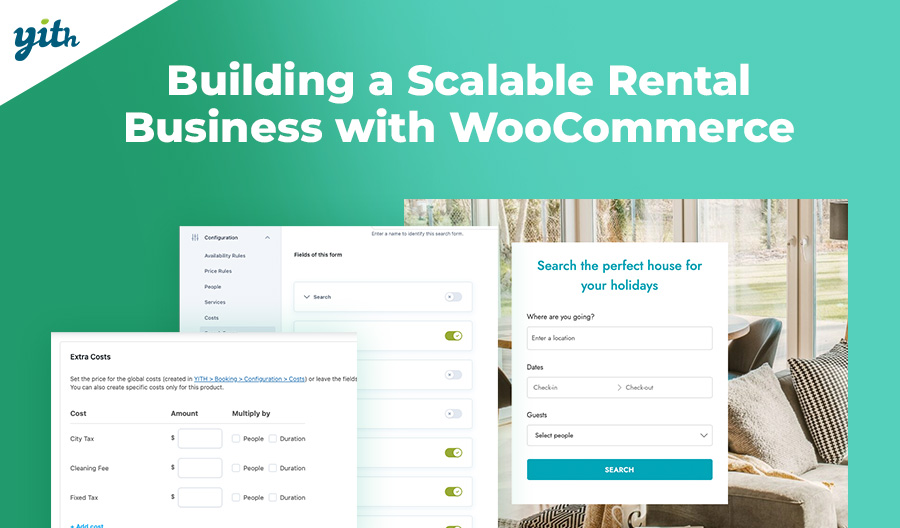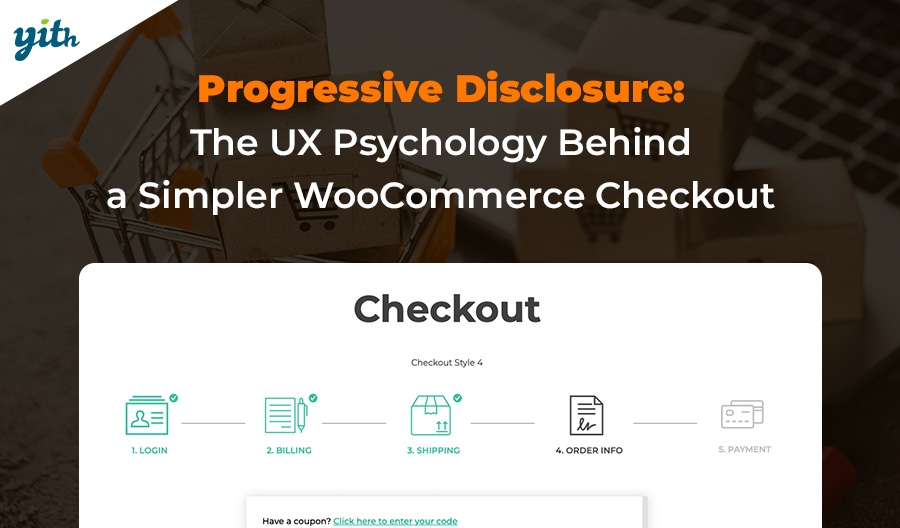If you’ve opened an online store (or are still in the process of opening one), you’ve probably noticed how the ongoing costs can pile up. You may have assumed that choosing a hosting provider and using a free platform like WordPress with free WooCommerce plugins would be enough. But soon you realize that many of the advanced features your online store needs are only available through premium plugins. While the official WordPress plugin directory offers a wide range of free and premium plugins, not all of them provide the essential features required for a professional WooCommerce business. So, which WordPress plugins should you trust? And which ones are preferred by established eCommerce platforms and successful site owners?
Table of contents
The Decision Every Store Manager Must Make
Should you opt for free, promising plugins, or invest in a premium version right away? Which option is best for your eCommerce business?
The concern behind this question is that selecting the wrong plugin can compromise your online store’s performance or security and waste your time or budget.
This article offers a clear, comprehensive guide to the pros and cons of free versus premium plugins. It provides all the resources needed to choose the best option independently.
Free Plugins: A Great Starting Point
First of all, it is important to understand that WordPress plugins typically fall into two categories: free plugins and paid plugins (also known as premium plugins). Let’s start with the free option.
There are thousands of free plugins available in the WordPress directory. WooCommerce is a free, open-source plugin that transforms your CMS into an eCommerce platform. It is one of the most widely used plugins in the world, if not the most widely used.
The WordPress.org repository is the best place to find most free plugins. They are ideal for startups, those who want to experiment, amateur portals, and sites not intended for the general public.
If you’re testing a concept or adding a simple feature to your eCommerce site, a free plugin is an excellent place to start. Many free plugins offer basic features that cover single-use cases without requiring an upfront investment.
Of course, there are also disadvantages to using free plugins. These include:
- Limited support: Based on community forums, with no guarantee of active support. Since there is no subscription model or recurring fees, developers may not provide dedicated support. This leaves users dependent on responses from other members of the WordPress community.
- Basic Features: A free plugin is often developed to solve a single problem. This means that they lack the advanced tools and comprehensive features of optimized premium plugins.
- Security and Updates: Unfortunately, it is common to find free plugins that haven’t been updated by their developers in months or years. Outdated plugins can expose vulnerabilities, compromise brute force attack protection, and endanger customer data, posing a risk to your online store.
- Compatibility: Frequent updates to WordPress and WooCommerce may cause plugin functionality issues. Plugins that haven’t been tested with the latest versions may cause errors or disrupt your shipping processes, payment gateways, and other critical systems.
Premium Plugins: An Investment in Growth
When it comes to building a WooCommerce store, premium plugins play a big part. While free plugins from the WordPress plugin directory offer a solid foundation, premium plugins bring a whole new level of advanced features and dedicated support, often through a subscription model or annual fee.
The recurring costs support the specialized companies that develop them. This ensures that there is continuous maintenance and updates, as well as high-level premium support. There are several companies working in this area, including YITH.
The “disadvantage” is the investment required for your eCommerce business, but there are many advantages:
- Advanced features: Premium plugins often offer many important features in one tool (like recovering abandoned carts, advanced wish lists, high-performance filters, and more), which improve your WooCommerce store.
- Dedicated and professional support: There’s a developer working behind the scenes to keep your plugin running smoothly. Sometimes, even entire teams of experts work on these projects, like with YITH. This means that every request is handled directly by someone trained on that specific tool. This allows for dedicated support and quick resolution.
- Security and reliability: Unlike many free WooCommerce plugins, our team of professionals guarantees constant updates, quality code, and compatibility assurance. This way, your store and your customers will always be safe.
- Complete documentation: Although the WordPress and WooCommerce communities have plenty of helpful texts, they are often not as reliable as the detailed guides, video tutorials, and knowledge bases continuously updated and produced by the developers themselves.
- A network of plugins: One of the most common problems with plugins is understanding how they interact with each other. Using free plugins developed by different programmers can result in unexpected artifacts and errors during implementation. When multiple plugins created by the same development team are used, as in the case of YITH, full compatibility is guaranteed, and advanced features created by combining different plugins are implemented.
Comparison Table: Free vs. Premium at a Glance
To help you better understand everything we’ve covered above, here’s a comparison table of free and premium plugins:
| Feature | Free plugin | Premium plugin (YITH) |
| Initial cost | $0 | Investment included |
| Support | Community forums | Team of dedicated experts |
| Features | Basic and limited | Advanced and growth-oriented |
| Security | Depends on the developer | Top priority |
| Updates | Inconsistent | Regular and guaranteed |
| Ideal for | Startups, testing, low budget | Growing and established businesses, professionals |
The Decision Framework: When to Switch to Premium?
As we’ve seen, there’s a time and place for both free and premium plugins. How do you know when it’s time to upgrade your WooCommerce business?
You might be tempted to delay the decision because it involves paid plugins, but be careful. Here’s what you can base your decision on.
Stick with a free plugin if:
- You’re just testing a business idea – In the early stages of a WooCommerce website, it often doesn’t make sense to make unnecessary investments. If you’re experimenting with ways to sell your products, free plugins might suffice.
- Your budget is absolutely zero – If you’re on a tight budget, premium plugins might be out of your reach. But we want you to think about whether this is really true. Investing in good tools can mean more sales and a better, more reliable website.
- The required functionality is extremely simple and not critical for sales – If you’re just using plugins for small features that don’t affect your store, you might get good results even with free ones. Just be careful not to use these tools to manage the most important parts of your store.
It’s Time to Invest in a Premium Plugin (YITH) if…
- The functionality is crucial to your revenue (e.g., checkout, filters, subscriptions) – Some parts of your WordPress site are more important than others. Plugins that affect product and category pages, checkout behavior, or WooCommerce subscriptions directly impact sales and payment processing. Mistakes here can lead to lost money and put customers at risk.
- You cannot afford downtime due to conflicts or bugs – An offline WooCommerce store or one with internal issues is dangerous. It causes short-term losses and undermines the image and reliability of your portal. Unfortunately, it is very difficult to regain customer trust once it is lost.
- You need a reliable partner to help you solve problems – WordPress and WooCommerce are exceptional tools. However, one of the worst experiences you can have is feeling alone when using them. Having a dedicated team ready to solve any problem that you may encounter can make a huge difference for store owners.
- You want to offer a better user experience than your competitors – Online competition is fierce, and every factor that gives you an advantage or puts you at a disadvantage makes a difference. Using only free plugins when your competitors opt for only the best on the market can leave you behind.
- Your time is more valuable than the cost of the plugin – Although the plugin requires an initial investment, don’t assume that using free plugins is cost-free. Expect long waits to resolve issues, the need to add custom code to integrate missing features, and downtime that affects the quality of your online store. These are all long-term costs.
The YITH Ecosystem: The Best of Both Worlds
However, there are intermediate solutions that allow you to have the best of both worlds. Consider YITH, for example, which has dozens of premium plugins and a huge development team behind it.
YITH’s philosophy is based on customer satisfaction. Many of their premium plugins are available in free versions with limited functionality. This allows you to start with free plugins supported by a reliable, experienced team and easily upgrade when the time comes.
Now, let’s look at a practical example of this approach.
Practical Example: From YITH Wishlist Free to Premium
For a specific example, think about the YITH WooCommerce Wishlist plugin which is one of the most popular plugins in the world. It offers both a free and a premium version:
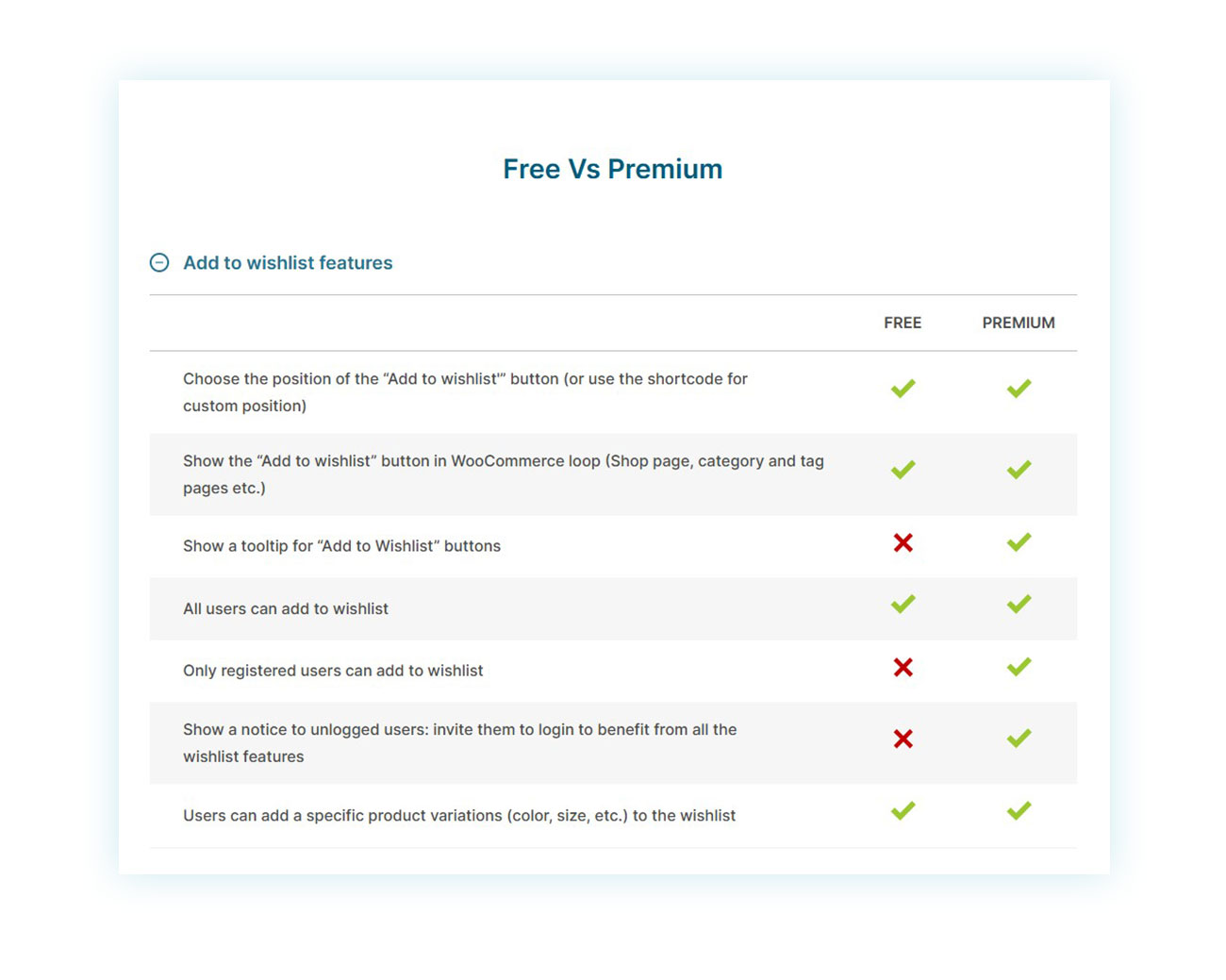
Let’s quickly review their features:
- Free version: Allows you to add an “Add to Wishlist” button to products in your store, enabling customers to create their own lists. It’s a great way to get started and experiment.
- Premium version: Unlock its full potential by setting up automatic emails for products on your wish list that are on sale. Analyze the most desired products to optimize your inventory and enable customers to create and share multiple wish lists. You can also allow customers to create public wish lists and share them with friends and family. This is a great way to exploit the tool’s full potential.
YITH WooCommerce Compare and Ajax Filter for WooCommerce
In addition to the Wishlist plugin, there are many others with free versions.
These include YITH WooCommerce Compare, which allows you to compare products in the store:
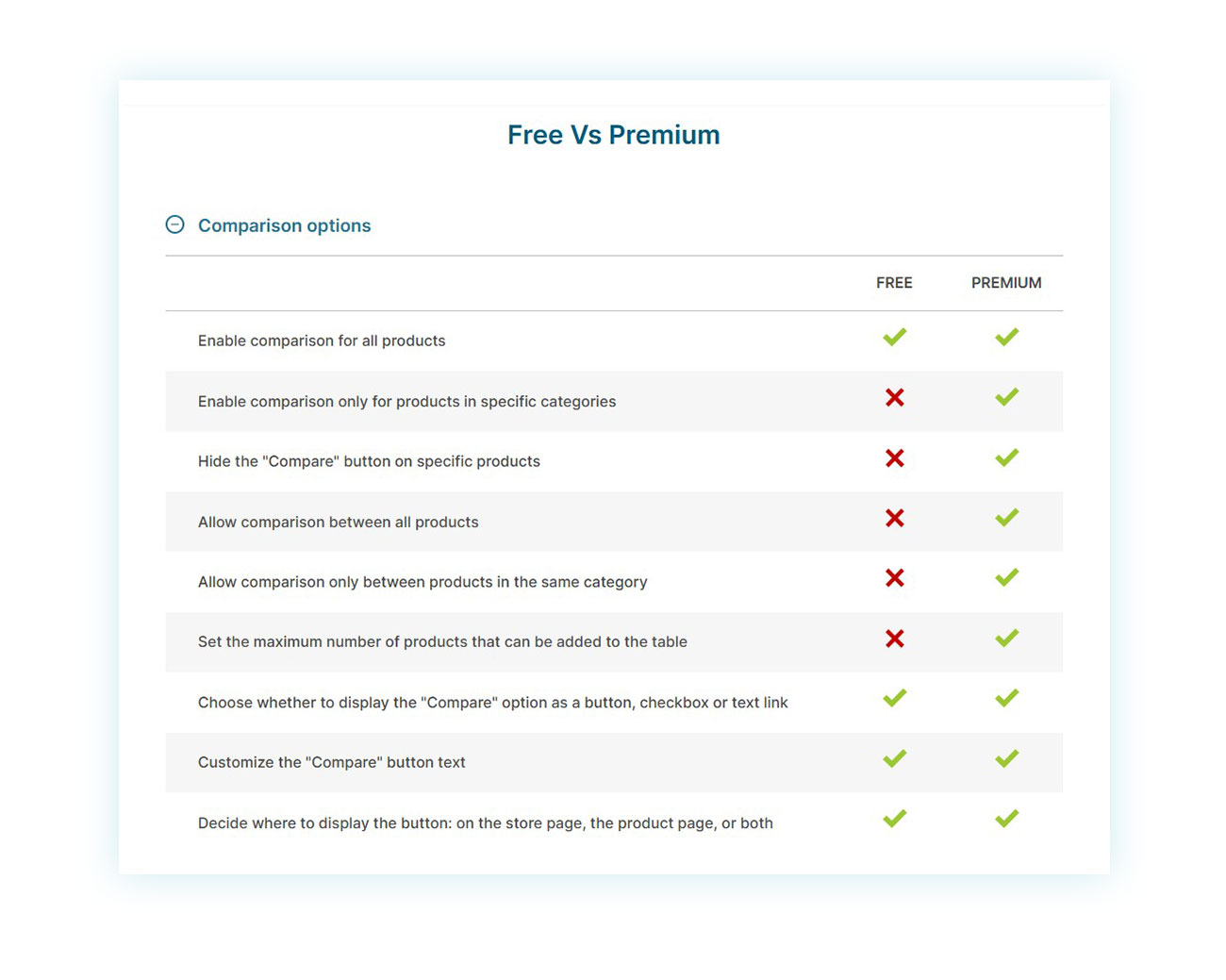
Another option is the YITH WooCommerce Ajax Product Filter plugin, which allows you to implement an efficient product filtering system in your store:
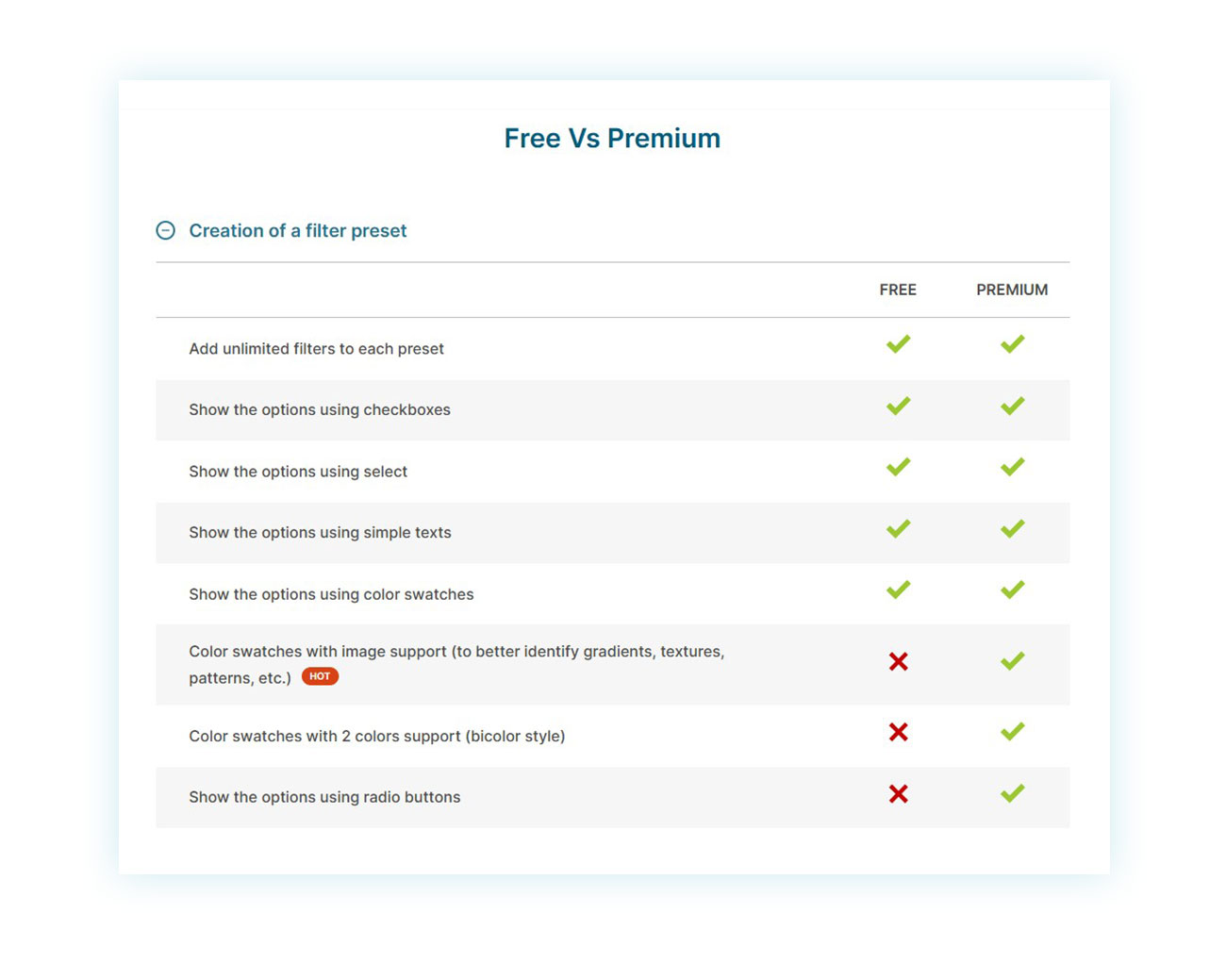
And much more.
Conclusion: Stop saving, start investing.
As you’ve seen, the real choice isn’t between free and paid tools, but rather which ones to use at different stages of your online business. Free plans are great for getting started and experimenting, but premium plugins are ideal if you want to grow your business and have a secure, optimized website.
Remember, your competitors will always choose the best solution for their online store. Don’t let the desire for immediate savings hurt your potential to sell online.
Explore our suite of premium plugins and see how we can help grow your business. If you’re not sure where to start, try the free versions of our most popular plugins and experience YITH quality for yourself with a simple download!


